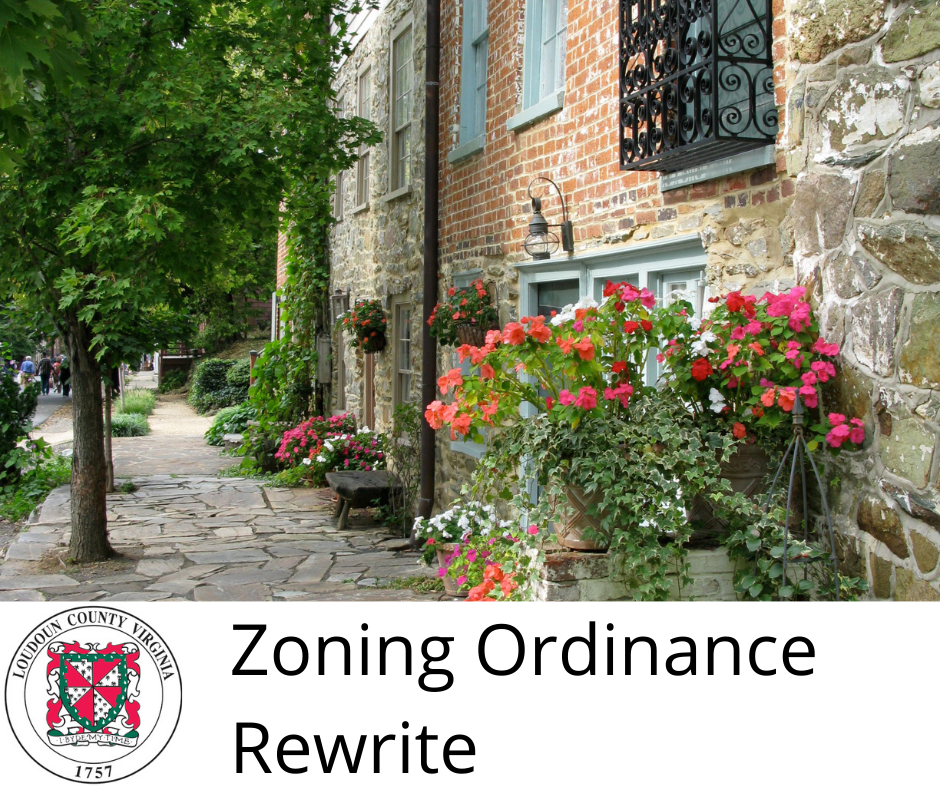Dear Waterford Friends and Supporters,
As you may be aware, the County is in the process of revising the zoning ordinance to reflect the new 2019 Comprehensive Plan. Loudoun’s zoning ordinances have not been updated for 20 years and a re-write is certainly due to reflect current needs and citizen vision as outlined in the new Comprehensive Plan.
We are now in the ‘Public Input’ phase, a three-month period continuing through July 18th, where comments from Loudoun citizens are welcome and encouraged. It’s important that the Loudoun County Zoning Staff hear from all Waterford’s citizens as the zoning code is what governs land use policy Staff will send their recommendation to the Planning commission, then forward to the Board of Supervisors for final approval
The Waterford Foundation has read the zoning code, with a focus on Adaptive Reuse (Chapter 5.10), which is important to the viability of our historic structures in the village. The Waterford Foundation has prepared a summary sheet to shorten your workload, attached below. We encourage citizens to make their voices heard before the July 18th deadline by following these steps for communicating with Zoning Staff.
If you have questions, feel free to call Jane Covington at 434-960-4678 or jane@janecovington.com
Thank you for your help!
Stephanie C. Thompson, Executive Director
Directions for submitting your comments on Adaptive Reuse to Loudoun’s Zoning Staff
Email your comments to Loudoun’s zoning staff at this address: ZOrewrite@loudoun.gov The Waterford Foundation has summarized our recommendations below in blue italics, but it’s best to communicate recommendation in your own words. While writing your comments, please feel free to reference the County’s zoning code on Adaptive Reuse, which can be found here: https://online.encodeplus.com/regs/loudouncounty-va-crosswalk/doc-viewer.aspx?secid=966 – secid-966. You may also wish to include with your email message a photo of your favorite historic Waterford building that you think is appropriate for adaptive reuse.
Chapter 5.10 Adaptive Reuse
Purpose
Discussion The new zoning code encourages adaptive reuse of historic structures but omits including standards of rehabilitation. We recommend referencing recognized standards to encourage retention of character defining features of historic properties or consulting with the local HDRC. We also see a natural overlap between adaptive reuse and the Sustainability movement.
Recommendation Please ask zoning staff to include the following:
“Encourage preservation of historic structures through appropriate renovation,such as the Secretary of Interior Standards and/or ruling by HDRC”
“Encourage sustainability by allowing more older buildings qualify under the Adaptive Reuse zoning regulations.”
Eligibility / Section B
Discussion We recommend broadening the scope of eligibility with the intention of allowing more older buildings to qualify under the Adaptive Reuse zoning regulations. We recommend streamlining the rezoning process to make the process more user-friendly and financially affordable by removing requirements such as market analysis, structural engineers, and verification of obsolescence. Adaptive reuse should not be expensive and burdensome
Recommendation: Please ask zoning staff to include the following:
“All properties over 50 years old should be eligible for adaptive reuse under the new zoning code or as designated locally historic’ by the Heritage Commission.”
“Please remove all the Zoning Administrator’s considerations of obsolescence of an old building, including past and current vacancy rate, existing and previous uses, structural condition, and real estate market information.”
Standards and Requirements / Section C
Discussion We recommend allowing more options when making changes as many historic buildings and sites don’t lend themselves to traditional zoning set-backs or rear, off-street parking spaces. When there are questions, we recommend the Zoning Administrator consult with the HDRC. It is agreed that the setting of an historic property warrants protection, but there needs to be flexibility to accommodate small or non-conforming sites. We also want to encourage agricultural buildings, such as old barns or mills, to have future uses.
Recommendation: Please ask zoning staff to include the following:
“Allow more exceptions for non-conforming sites for setbacks, on-site parking, and additions to the front of the structure. Where there are questions, the Zoning Administrator should consult with the HDRC.”
“Please allow industrial /craft uses such as woodworking, metal working and stonework”
Extra Credit:
- If you have the time and energy to submit detailed comments through the online public comment system, see the detailed instructions for posting comments in this pdf: ZOR Public Comment Instructions
- To learn more about recommendations from the Loudoun Historic Village Alliance, see this document: LHVA Recommendations
